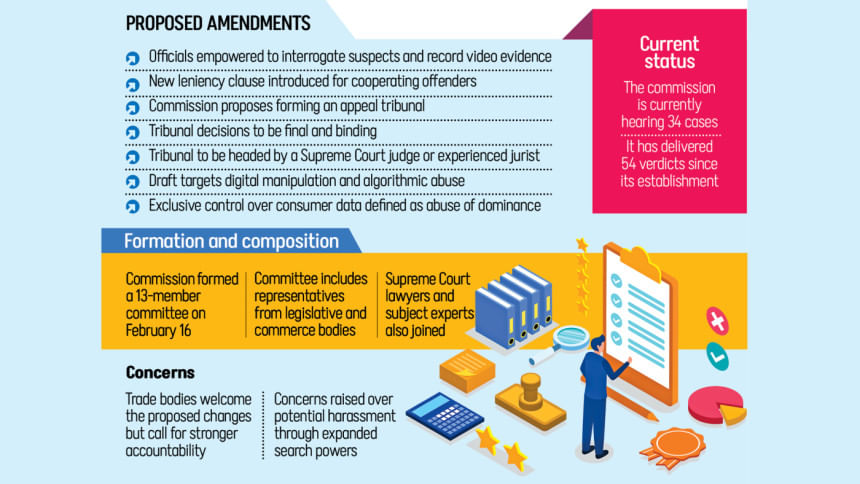Competition Commission may get search and seizure powers

Similar to raids by tax officials, the Bangladesh Competition Commission (BCC) will be able to search offices and seize documents, computers and electronic data, according to proposed amendments to the Competition Act.The commission staff will be allowed to interrogate suspects, and prepare seizure lists while recording video evidence in presence of witnesses, according to the draft. It also introduces a leniency provision, allowing reduced or waived punishment for individuals, groups or or...
Similar to raids by tax officials, the Bangladesh Competition Commission (BCC) will be able to search offices and seize documents, computers and electronic data, according to proposed amendments to the Competition Act.
The commission staff will be allowed to interrogate suspects, and prepare seizure lists while recording video evidence in presence of witnesses, according to the draft.
It also introduces a leniency provision, allowing reduced or waived punishment for individuals, groups or organisations that admit wrongdoing and cooperate fully during investigations. This clause is new to the current Competition Act-2012.
Businesses dissatisfied with commission penalties will be able to appeal to a new Competition Appellate Tribunal. However, they must first deposit 25 percent of the imposed fine. If the appeal succeeds, the amount will be refunded. The tribunal's decision will be considered final.
A law teacher at Dhaka University welcomed the proposed changes but said the draft does not have measures to ensure the accountability of the commission.
Meanwhile, trade chambers expressed concern that some provisions could lead to increased harassment of businesses.
However, commission officials said the draft follows global best practices and was prepared after careful review.
The Competition Commission, created under the 2012 law, began operations in 2016. It functions as a referee in the marketplace, ensuring fair play among businesses, preventing price fixing, and protecting consumers from unfair practices.
LAW TO CURB DIGITAL MANIPULATION, FORM APPEAL TRIBUNAL
The draft law empowers the commission to take legal action against those using algorithms, automated pricing or digital tools to distort competition in online markets.
Officials said the aim is to align the law with modern digital economies and to tackle abuses of market dominance.
Another new clause identifies exclusive control over consumer data as an abuse of dominance if used to block competitors from entering the market.
In the draft, the commission has also proposed forming an appeal tribunal. It will handle appeals against commission decisions.
It will have a chairperson, who must be a Supreme Court judge or someone with at least twenty years of judicial experience, and up to two members with at least twenty years of experience in economics, law, business, or accountancy. Only one member from each field can be appointed.
Appeals must be lodged within 30 days of receiving the order, with payment of the required fee. If the appeal involves a financial penalty, the appellant must deposit 25 percent of the fine. Tribunal rulings will be final.
To ensure fair hearings and due process, the draft emphasised an independent tribunal, similar to systems found in many developed countries.
PROPOSED CHANGES RECEIVE CAUTIONARY WELCOME
Business leaders and economists have given the amendments a guarded welcome.
Taskeen Ahmed, president of the Dhaka Chamber of Commerce and Industry (DCCI), said the changes could strengthen transparency by addressing issues such as abuse of dominance, tying products with services, algorithmic manipulation and leniency.
He, however, said that identifying dominant players must be based on evidence, considering market structure, competition levels and consumer interest.
He also warned that the proposed search powers could lead to harassment and obstruct business growth.
Selim Raihan, an economics professor at Dhaka University, described the amendments as a major step forward, bringing competition laws in line with global standards. "The inclusion of new concepts such as leniency, collective dominance and digital market abuse shows awareness of evolving market dynamics," he said.
He added that establishing an appellate tribunal would strengthen checks and balances and improve due process, which is not present in the current law.
The expanded search and seizure powers, he said, would enhance the act's operational scope if implemented responsibly.
However, Azhar Uddin Bhuiyan, lecturer at the law department of Dhaka University, said that the amendments expand the commission's discretionary power without adequate oversight.
He said broad definitions, sweeping search powers and a vague leniency system could open the door to arbitrary enforcement.
"The amendments do not ensure the commission's accountability," he said, adding that excessive authority could discourage legitimate business cooperation and innovation.
NO JAIL TERMS FOR VIOLATIONS
Akhtaruzzaman Talukder, a member of the Competition Commission, said critics are mistaken in claiming the amendments dangerously expand its powers.
The system in Bangladesh, he said, remains more relaxed than those of the UK and the US.
He pointed out that, unlike in some countries, the proposed law does not introduce jail terms for competition offences.
"Although the draft may appear stricter, its real impact will depend on how it is implemented," said Talukder.
According to commission data, 34 cases are now under hearing, and 54 verdicts have been delivered since the commission was established.
BCC Chairperson AHM Ahsan said competition laws from India, Pakistan, Indonesia, the United States and the United Kingdom were studied before drafting the proposals.
"The draft will be finalised after consultations at the ministry level," he said.